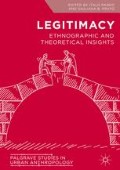Abstract
Drawing on field research in Tyre, Mollica addresses conflicting loyalties and legitimate illegality. In the Lebanon, the idea of a ‘co-cultural’ architecture does not work because the electorate acts, and votes, according to ethno-religious interests. Hezbollah—a political legal entity and a paramilitary illegal entity—does much illegal policing and enjoys legitimacy within and without the local community. Its (illegal) use of power is not seriously challenged by legal powers—the Lebanese Army and the peacekeeping United Nations Interim Forces in Lebanon—that cannot guarantee the security of the religious community. This ethnography raises questions on the definition of ‘citizenship’, as belonging is conceptualized by reference not to the nation state but to (religiously defined) groups, acting in an (ethno-religiously defined) area to pursue (ethno-religiously defined) interests.
I wish to acknowledge the support of the Italian Ministry of Education, University and Research under the ‘Rita Levi Montalcini Programme’ for the 2014 research field trip in South Lebanon. I am also grateful to the anonymous reviewers for their critical comments.
Access this chapter
Tax calculation will be finalised at checkout
Purchases are for personal use only
References
Abisaab, R., and M. Abisaab. 2014. The Shiʿites of Lebanon: Modernism, Communism, and Hezbollah’s Islamists. Syracuse: Syracuse University Press.
Cambanis, T. 2011. A Privilege to Die: Inside Hezbollah’s Legions and Their Endless War Against Israel. New York: Free Press.
Daftary, F. 2013. A History of Shiʿi Islam. London: I.B. Tauris.
Fawaz, G.A. 2016. ISIS. A History. Princeton: Princeton University Press.
Gupta, A. 1995. Blurred Boundaries: The Discourse of Corruption, the Culture of Politics, and the Imagined State. American Ethnologist 22 (2): 375–402.
Hage Ali, M. 2018. Nationalism, Transnationalism, and Political Islam. Hezbollah’s Institutional Identity. London: Palgrave Macmillan.
Harik, J.P. 2004. Hezbollah: The Changing Face of Terrorism. London: I.B. Tauris.
Harris, W. 2012. Lebanon. A History, 600–2011. Oxford: Oxford University Press.
Heater, D. 1990. Citizenship: The Civic Ideal in World History, Politics and Education. London: Longman.
Kerr, M. 2005. Imposing Power-Sharing. Conflict and Coexistence in Northern Ireland and Lebanon. Dublin: Irish Academic Press.
Kodmani-Darwish, B. 1987. Liban: espoirs. Paris: Ifri.
Lijphart, A. 1999. Patterns of Democracy. Government Forms and Performance in Thirty-Six Countries. New Haven: Yale University Press.
Louër, L. 2012. Shiʿism and Politics in the Middle East. London: C. Hurst & Co..
Makdisi, U. 2000. The Culture of Sectarianism: Community, History, and Violence in Nineteenth-Century Ottoman Lebanon. Berkeley: University of California Press.
Mollica, M. 2006. Diario dal Libano. Messina: Armando Siciliano Editore.
———. 2008. Ethnography under Fire: Alma el-Shaab Summer 2006. In Different Approaches to Peace and Conflict Research, ed. R. Hudson and H.-J. Heintze, 159–182. Bilbao: University of Deusto Press.
———. 2011. Erosion of Legitimacy: A Lebanese Case of Collapsed Governance. In Citizenship and the Legitimacy of Governance: Anthropology in the Mediterranean Region, ed. I. Pardo and G.B. Prato, 191–209. Farnham: Ashgate (now published by Routledge).
———. 2014a. When the Ethnographer Encounters War. In Anthropology of Fear Cultures Beyond Emotions, ed. A. Boscoboinik and H. Horakova, 205–218. Münster: LIT Verlag.
———. 2014b. A Post-War Paradox of Informality in South Lebanon: Rebuilding Houses or Destroying Legitimacy. Studies of Transition States and Societies 6 (1): 34–49.
———. 2016. Terra e società etniche divise: il caso del Libano del Sud. Messina: Armando Siciliano Editore.
Mollica, M., and J. Dingley. 2015. Sectarian Dynamics of Multi-Cultural Norms and the Law in Lebanon: A Warning for the Future of Northern Ireland. National Identities 17 (4): 405–431.
Norton, A.R. 2007. Hezbollah: A Short History. Princeton: Princeton University Press.
Pardo, I. 2000. Introduction. Morals of Legitimacy: Between Agency and the System. In Morals of Legitimacy: Between Agency and the System, ed. I. Pardo, 1–26. Oxford: Berghahn.
Pardo, I., and G.B. Prato. 2011. Introduction: Disconnected Governance and the Crisis of legitimacy. In Citizenship and the Legitimacy of Governance: Anthropology in the Mediterranean Region, ed. Italo Pardo and Giuliana Prato, 1–23. Farnham: Ashgate (now published by Routledge).
United Nations High Commissioner for Refugees. Syria Regional Refugee Responses. Lebanon. http://data.unhcr.org/syrianrefugees/country.php?id=122. Accessed 9 Feb 2018.
United Nations Relief and Works Agency for Palestine Refugees in the Near East. Where WE Work. Lebanon. https://www.unrwa.org/where-we-work/lebanon. Accessed 9 Feb 2018.
United Nations Security Council Resolution, Number 425 (19.03.1978). http://unscr.com/en/resolutions/425.
United Nations Security Council Resolution, Number 426 (19.03.1978). http://unscr.com/en/resolutions/426.
United Nations Security Council Resolution, Number 1559 (02.09.2004). http://unscr.com/en/resolutions/1559.
———, Number 1701 (11.08.2006). http://unscr.com/en/resolutions/1701.
Welles, B.C. 1997. Diodorus of Sicily: The Library of History, Books XVI. 66–XVII. Cambridge: Harvard University Press.
World Heritage List, United Nations Educational, Scientific and Cultural Organization, Tyre. http://whc.unesco.org/en/list/299. Accessed 9 Feb 2018.
Author information
Authors and Affiliations
Corresponding author
Editor information
Editors and Affiliations
Rights and permissions
Copyright information
© 2019 The Author(s)
About this chapter
Cite this chapter
Mollica, M. (2019). Conflicting Loyalties and Legitimate Illegality in Urban South Lebanon. In: Pardo, I., Prato, G.B. (eds) Legitimacy. Palgrave Studies in Urban Anthropology. Palgrave Macmillan, Cham. https://doi.org/10.1007/978-3-319-96238-2_12
Download citation
DOI: https://doi.org/10.1007/978-3-319-96238-2_12
Published:
Publisher Name: Palgrave Macmillan, Cham
Print ISBN: 978-3-319-96237-5
Online ISBN: 978-3-319-96238-2
eBook Packages: Social SciencesSocial Sciences (R0)

